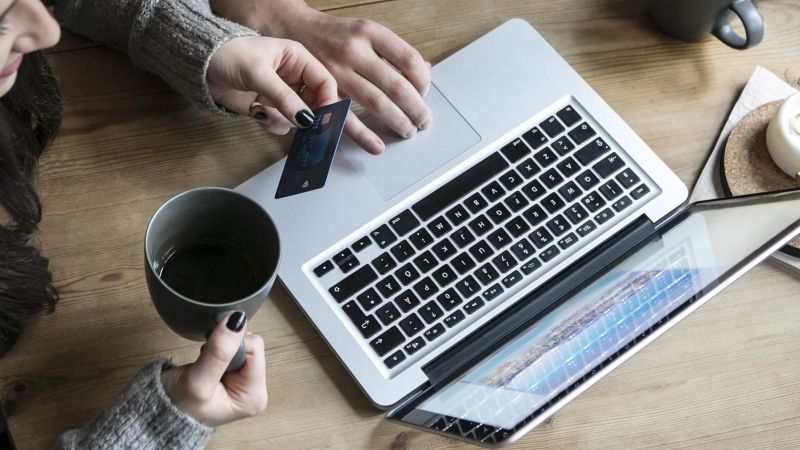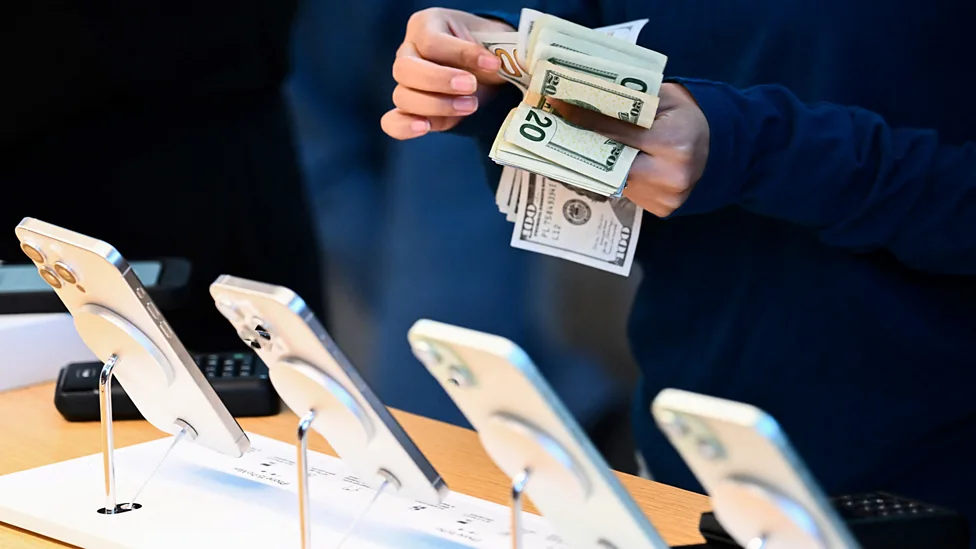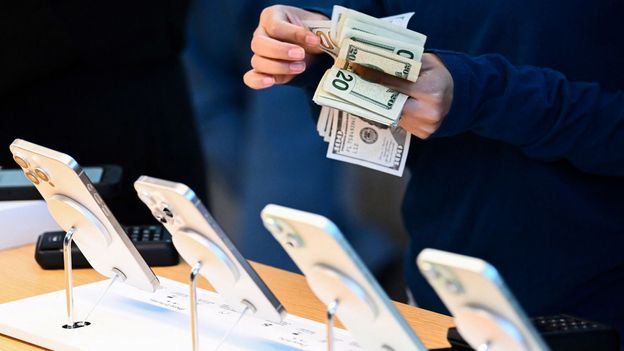I think some posters in here are forgetting that credit cards existIt's ugly out there, you just can't see it

Americans’ credit card debt hits a record $1 trillion | CNN Business
Americans’ credit card debt levels have just notched a new, but undesirable, milestone: For the first time ever, they’ve surpassed $1 trillion, according to data released Tuesday by the Federal Reserve Bank of New York.amp.cnn.com
You are using an out of date browser. It may not display this or other websites correctly.
You should upgrade or use an alternative browser.
You should upgrade or use an alternative browser.
Why Americans' 'YOLO' spending spree baffles economists
- Thread starter NoirDynosaur
- Start date
More options
Who Replied?it depends how they are breaking these stats out
which income profile is spending hte most
is one carrying the load?
which income profile is spending hte most
is one carrying the load?
FishNGrits
Superstar
Economics is a social science that a bunch of snobs try hard to make it a hard science. You can’t quantify this shyt man. Fck emAny economist by training is ill-equipped to account for people who are incapable of seeing consequences.
You make a good point about government spending.I mean, some folks realize they won’t really be able to retire due to rising inflation vs stagnant wage increases, and also realizing that they aren’t gonna make it into their 70s (or even 60s) and shyt, and also realizing that the government is spending recklessly…and they just say “fukk it”.
They’re sending money to Ukraine, Israel, and blowing bags on illegal immigrants so why tf not live themselves!?
Ironically, I got a degree in economics but you’re right. Humans and society change a lot and frequently nowadays.Economics is a social science that a bunch of snobs try hard to make it a hard science. You can’t quantify this shyt man. Fck em
International Playa
Playa with a Passport
Buy now, pay later schemes & credit cards 


Despite past trends, US consumers are spending at record levels. Economists are mystified – and struggling to forecast an end point.
Throughout a period of sky-high interest rates, depleted savings and grinding inflation, Americans have spent with abandon.
On Black Friday, sales at brick-and-mortar stores were up 1.1% from last year; online alone, US shoppers spent a record $9.8bn (£7.72bn) online alone. Consumers spent another $12.4bn (£9.77bn) on Cyber Monday – an eye-popping 9.6% increase over last year. This holiday splurge follows a pattern of US consumer spending, which has buoyed the American economy in the past year, making up nearly 70% of the real GDP's 4.9% Q3 growth.
While some of this spending reflects the rising cost of necessities, Americans are also still buying big-ticket items and laying out tons of cash for experiences. This "YOLO" attitude towards money bucks the spending trends of past economic downturns – and some economists have been left scratching their heads, especially as consumer sentiment on the economy remains overwhelmingly pessimistic.
"If 18 months ago, you'd have said the Federal Reserve Bank could raise interest rates by 500 basis points, and the consumer would chug on, relatively unfazed, I would have been extremely surprised," says Ellie Henderson, an economist at UK-based, global bank Investec. "I'd have said, 'that's just not how economics works'."
Typically, after a major crisis or job-market downshift, the economy generally experiences a small bump in both consumer savings and spending. However, the San Francisco Reserve Bank (SFRB) reported in May that the post-pandemic rise in fiscal spending this year has soared beyond the growth of any other post-1970s recessions.
Much of that growth, wrote SFRB experts, is due to an "unprecedented" increase of accumulated savings in US households, driven by the US Federal Government's swift fiscal response to the pandemic. Stimulus packages that directly introduced $5tn (£3.9tn) into the US economy, combined with other indirect policies including eviction moratoriums and the suspension of student loan payments saved Americans about $2.3tn (£1.8tn) in 2020 and 2021.
Although this year, people have drawn down their savings, many consumers still have money in their reserves – some for the first time ever – and they're willing to spend it now, even as they don't have faith in a full economic rebound. This sustained period of "you-only-live-once"-esque spending amid rising debt and dwindling savings has confounded many economists.

Leading the charge on this YOLO spending reports Boston Consulting Group, are the younger, upper-middle class segments of the US population. While these individuals are not necessarily affluent, they are earning enough money to meet their needs, and are still able to spend on pleasure trips and luxury goods. Many of them are also leaning into using buy-now-pay-later (BNPL) platforms, which are experiencing major growth in the US, including during November's Black Friday shopping spree.
"The strength of consumer spending, even after the dark days of the pandemic, has taken me by surprise," says Wendy Edelberg, senior fellow in economic studies at The Brookings Institution and director of The Hamilton Project.
Even if the pattern doesn't follow economic precedent, however, some experts argue it makes sense intuitively.
"When you don't really know what the future holds – or even if there's a long enough future for you – people are focusing on the present and the short-term horizon," says Chiraag Mittal, an assistant professor of marketing at the McIntire School of Commerce, University of Virginia. And, he says, amid shifting attitudes around work and life, "people are choosing to prioritise their happiness and fun".
Malcolm Harris, author of Palo Alto: A History of California, Capitalism, and the World, argues intangible factors like these often get lost in the qualitative analyses that seek to explain macroeconomic trends. "Working life can change in qualitative ways that the metrics are bad at picking up,” he says.
Even though many people are still employed and earning pay cheques, he argues, they're not necessarily happy – wages still are not keeping up with the pace of inflation, for instance, and people are still reeling from the physical and psychological trauma of the Covid-19 pandemic.
"Although job satisfaction numbers seem strong, life happiness metrics are in the dumps," says Harris. "Given how much of our life is related to work, how can analysts square that circle?"
However inexplicable the phenomenon feels, several economists agree these YOLO spending patterns can't continue forever, and that the economic landscape is on the brink of change.
Henderson says there are major headwinds coming that could affect this, such as the October expiration of childcare grants, and the return of student loan payments. "How could that not hit consumption going forward?" she says.
Additionally, US credit card debt has surpassed $1tn (£788bn) for the first time, and economists predict it's unlikely the cost of basic goods will drop soon, even as inflation slows. (Plus, those BNPL bills will come due, too.)
Henderson predicts it's only a matter of time before some Americans are forced to tighten their belts and restrain their splurging. After such an exceptional fiscal year, however, Edelberg is less certain.
"I really don't know when it will go down – it depends on which part of my brain you ask," she says. If she were to hedge, she says the behaviour change would come by the end of the year. Yet, she says, "honestly, I would not be surprised if I were surprised".

Why Americans' 'YOLO' spending spree baffles economists
Despite past trends, US consumers are spending at record levels. Economists are mystified – and struggling to forecast an end point.www.bbc.com
The U.S gov been YOLO with taxpayer money now economist are baffled why consumers aren’t saving their money?

Tres Leches
Empire Business
Why are they surprised the American government been YOLOing spending since Bush came into office , Americans just following their government 

Tribal Outkast
Veteran
But that dude in the other thread showed a video of an empty JC Penny and Best Buy.For the last 2 years this youtuber I watch has been saying it's a recession and the economy is messed up, but when I'm outside I see people (me included) running through money
 I thought it was over.
I thought it was over.Cakebatter
All Star
If Americans spent 9% more on Black Friday and Cyber Monday compared with last year, that matches up with the inflation of consumer prices over the past year. I want to know what manufacturers came out the big winner? Disneyland/World traffic has been down over the past 4 months. Auto sales are down. Apple was down for its last quarterly earnings report. So if consumers are splurging so much, someone has to be benefitting from it. Oooor it's all 

$cam-U-Well_Jack$on
Superstar
Trying times.
Richard Glidewell
Yall done tore all the bottom of ya shoes w/me!!!
Do with your money whatever the fukk you want. They try to get you caught up in invest this and save that and that shyt has no real realistic chance with the actual average American. These mufukkas are duplicitous snakes and want your money to make money with while paying you pennies in return. Save your own money, the way it used to actually be done, dollar by dollar in your own account that nonone has access to and isn't charging you fees for nothing.........don't let these fukking vultures use you in their game.
Similar threads
- Replies
- 4
- Views
- 536